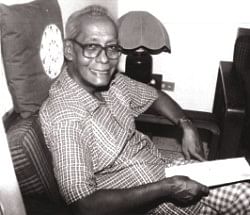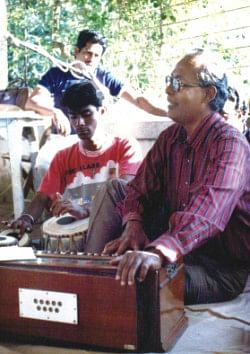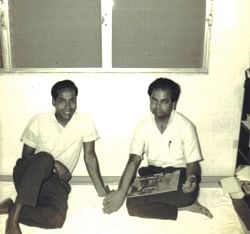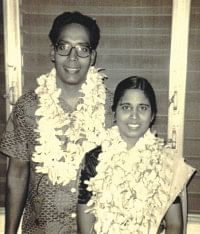| Home - Back Issues - The Team - Contact Us |
 |
| Volume 10 |Issue 19 | May 20, 2011 | |
|
|
Remembrance A Renaissance Man MITA CHOWDHURY All that I know about Benedict Gomes has been gleaned from members of his family and his many close friends and associates. But a definite profile emerged from my many conversations with people who knew him. A loving son, husband and father, a caring and gentle teacher, a good friend, a brilliant scientist and a lover of the arts. If any of you have read Shankar's 'Epar Bangla, Opar Bangla' you will find a reference to Benedict Gomes when Shankar had the great fortune to meet this great representative of Bengal on US soil. Benedict would have been 77 on the 22nd of May 2010 but on the 15th of May that year he passed away after a protracted illness.
Benedict was born in 1933 to Domingo and Sabina in the village of Deotola of Nababganj district. Domingo and Sabina were far from being well-off but when Domingo died leaving behind a large family, his wife was plunged into extreme poverty. Benedict was in sixth grade at the time of his father's death. Sabina, a strong and determined woman held her family together and became the inspiration and mentor for her children, especially Benedict. Many years later Benedict acknowledged the debt towards his mother by dedicating his doctoral thesis to her. Benedict most certainly inherited his core values of hard work, social ethics and religious principles from his parents. Family members still share with immense pride the story about Domingo, Benedict's father, setting off for India on a boat in order to earn money for food when uncharitable neighbours refused to lend a hand and of Benedict, his son, working in the village paddy fields to help the family. Another interesting anecdote about Benedict relates to his actions during the 1952 Language Movement. As soon as he heard about the deaths of the students he went on to ring the school bell to announce the sad news to his fellow pupils and to express his solidarity with the language martyrs. All the pupils of Holy Cross School in Bandura responded to Benedict's call and left their classes. The school authorities promptly expelled Benedict for his overt rebellious behaviour. The expulsion order was later rescinded when the authorities realised that they had unjustly punished one of their most meritorious pupils.
Very early on Benedict became the pride of his family and his village. He matriculated from Holy Cross School in 1953 and was subsequently awarded first division in his higher secondary examinations in Science from St. Gregory's College (later named Notre Dame College). The young man's brilliance did not go unnoticed by Reverend R.W. Timms who advised him to continue with the sciences. Benedict took his wise counsel on board and went on to gain a 1st Class degree in Biochemistry from Dhaka University in 1959. At around that time he was introduced to Martha by his elder brother. The young woman to whom Benedict was introduced was already closely involved with Bangla theatre. She was one of the first brave Bengali women to have stepped onto the stage at a time when such pursuits by women from respectable backgrounds were frowned upon. Benedict must have been very attracted to the beautiful, intelligent and talented young Martha for their marriage was arranged very soon afterwards. Martha and Benedict shared a passion for the arts which explains why theatre and music played such an important role in their life together. The couple went on to have four children during the next ten years. They named them Jennifer Kallyani, Dominic Probhat, Catherine Kamini and Richard Shishir. As parents they instilled in their children the importance of education, hard work and social and religious values; even a brief acquaintance with Benedict and Martha's children will suggest that they conduct their lives according to those same values.
Benedict's passion for knowledge led him to apply for a fellowship in nutritional studies in order to conduct research from October 1959 to August 1961. He then began his long teaching career by joining Dhaka University in 1961 in the Department of Biochemistry. His students speak of him with great fondness and remember him as an energetic and brilliant man who treated them with kindness and respect. His classes, they say, were a joy to attend and his care for his students extended beyond the lecture halls. In 1964 Benedict embarked on pre-doctoral study and research in biochemistry at the University of Hawaii. He performed research on Enzymology at the East West Center from 1966 and attained his PhD in 1968. Naturally Benedict's, now Dr Gomes's, achievement was a matter of great pride and joy for his family but his success was celebrated by the whole Christian community in the then East Pakistan for he was the first among them to attain such academic honour. After receiving his PhD, Benedict returned to Bangladesh and worked for ICDDR,B. At the request of Dr. Kamal who was the head of department, he re-joined Dhaka University's Biochemistry Department. At the same time a post-doctoral fellowship enabled Benedict to undertake research on enzyme purification at the University of Hawaii. In 1981 he was honoured with the position of Professor in the Department of Biochemistry at Dhaka University. Also in 1981 he was invited to serve as visiting professor at Emory University of Atlanta, Georgia in the US. In 1985 he was appointed United Nations University Special Fellow and performed research for the Dunn Nutritional Laboratories in Cambridge, UK. In 1983 Benedict was appointed Chairman of the Department of Biochemistry where he served until 1986. Although he officially retired from the faculty in 1996, he continued to lecture until a stroke left him incapacitated. Throughout his active life, Benedict placed great faith in the country's youth and actively worked towards social reform. He firmly believed that the young people had to be helped and their energies channelled for the good of society; at the same time he was convinced that education and hard work can lead one to great heights of success. He is credited with developing numerous social and youth organisations and enterprises, most notably the Chhatra Kallyan, Tribeni and Deotola Tarun Shangha. He never hesitated to give up his time to advise and help the young and many of his students claim that doors opened for them as a result of Benedict's counsel and quiet support. He was a true role model for the Christian community in Bangladesh as well as the youth of the country.
Benedict led a full life in every way and enjoyed everything he did. His was not the remote and aloof life of an academic sitting in his ivory tower. He enjoyed being in the company of artists and intellectuals and was often seen in Beauty Boarding in Luxmibazaar during the 50s where he immersed himself in discourse with the likes of Zainul Abedin, Kamrul Hasan, Shamsur Rahman, Sardar Fazlul Karim and other contemporary eminent artists, poets and writers of this country. He loved playing bridge with his friends; apparently these bridge parties were often punctuated by Benedict's hearty laughter. His fondness for theatre and music was displayed by his keen involvement with stage plays and composition of songs. He would direct, design and act. He composed songs. Rehearsals held in his own home were noisy and happy occasions. He loved singing himself and his renditions of Kirton is still talked about with great admiration. He often served as judge in cultural competitions held at Dhaka University's Teacher Student Centre. Benedict's spirit of reform and betterment of the Christian community led him to be closely associated with the late Archbishop of Dhaka, Most Reverend Michael Rozario. They subsequently became close friends. He was an advisor to the Ramna Parish Council, the C.O.R.R., the Jute Works, World Vision and Caritas. He would visit his village Deotola twice a year to discuss ways of improving the village and actively contributed to its development. Benedict was a patron and adviser to many national and international committees of biochemistry, medicine and nutrition. His advice was eagerly sought and respected by his peers. A little known fact was the matter of Benedict being consulted by the Nobel Prize Committee to put forward nominations for the Chemistry Prize for 1987. Martha, his widow, has told me on a number of occasions that her husband was a plain and ordinary man. However, from the sincere outpouring of grief that I witnessed at this funeral last year and from the eulogies that I have read, it appears that a 'plain and ordinary' man was loved and respected by many. He who lived his life according to a set of well-defined principles and values, without fanfare and public show was a true role model and we lost a true renaissance man.
Copyright
(R) thedailystar.net 2011 |



